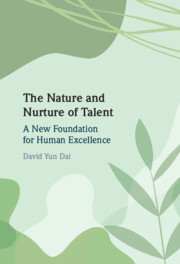Book contents
- The Nature and Nurture of Talent
- The Nature and Nurture of Talent
- Copyright page
- Dedication
- Contents
- Illustrations
- Foreword
- Acknowledgments
- Introduction Rationale, Goals, and Overview of the Book
- Chapter 1 The Evolving Complexity Theory of Talent Development
- Chapter 2 The Question of What Develops
- Chapter 3 The Question of How Talent Develops
- Chapter 4 The Question of When Critical Events Should Take Place
- Chapter 5 The Question of Where
- Chapter 6 How ECT Explains Various Talent Achievements
- Chapter 7 ECT in a Broader Landscape of Theoretic Models
- Chapter 8 Implications of ECT for Talent Identification and Assessment of Developmental Progressions
- Chapter 9 Implications of ECT for Promoting Human Excellence
- Chapter 10 Implications of ECT for Research Methodology
- Epilogue Is AI a Threat to Human Excellence?
- Postscript
- Glossary
- References
- Index
Chapter 1 - The Evolving Complexity Theory of Talent Development
An Overview of “One Long Argument”
Published online by Cambridge University Press: 20 June 2024
- The Nature and Nurture of Talent
- The Nature and Nurture of Talent
- Copyright page
- Dedication
- Contents
- Illustrations
- Foreword
- Acknowledgments
- Introduction Rationale, Goals, and Overview of the Book
- Chapter 1 The Evolving Complexity Theory of Talent Development
- Chapter 2 The Question of What Develops
- Chapter 3 The Question of How Talent Develops
- Chapter 4 The Question of When Critical Events Should Take Place
- Chapter 5 The Question of Where
- Chapter 6 How ECT Explains Various Talent Achievements
- Chapter 7 ECT in a Broader Landscape of Theoretic Models
- Chapter 8 Implications of ECT for Talent Identification and Assessment of Developmental Progressions
- Chapter 9 Implications of ECT for Promoting Human Excellence
- Chapter 10 Implications of ECT for Research Methodology
- Epilogue Is AI a Threat to Human Excellence?
- Postscript
- Glossary
- References
- Index
Summary
Chapter 1 provides an introduction to evolving complexity theory (ECT) of talent development (TD), a new theory that adopts a relational developmental-systems perspective on how talent is developed and human excellence achieved. A developmental-systems theory has to address the questions of what develops, how it develops, when it takes place, where (i.e., social-historical conditions and cultural contexts) it takes place, with each constraining one’s chance of success. Evolving complexity refers to the nature of TD as encompassing biological, experiential, cognitive, and sociocultural aspects in developmental self-organization, resulting in distinct individuality, of which specific talent achievement is a manifestation. ECT distinguishes itself from other TD models in its emphasis on the primacy of action/interaction, and the nature of TD as adaptation to task affordances and constraints. ECT also views TD as the means to an end of creating a productive, fulfilling life, and there are many niches and pathways to excellence within and across domains.
Keywords
- Type
- Chapter
- Information
- The Nature and Nurture of TalentA New Foundation for Human Excellence, pp. 15 - 33Publisher: Cambridge University PressPrint publication year: 2024

